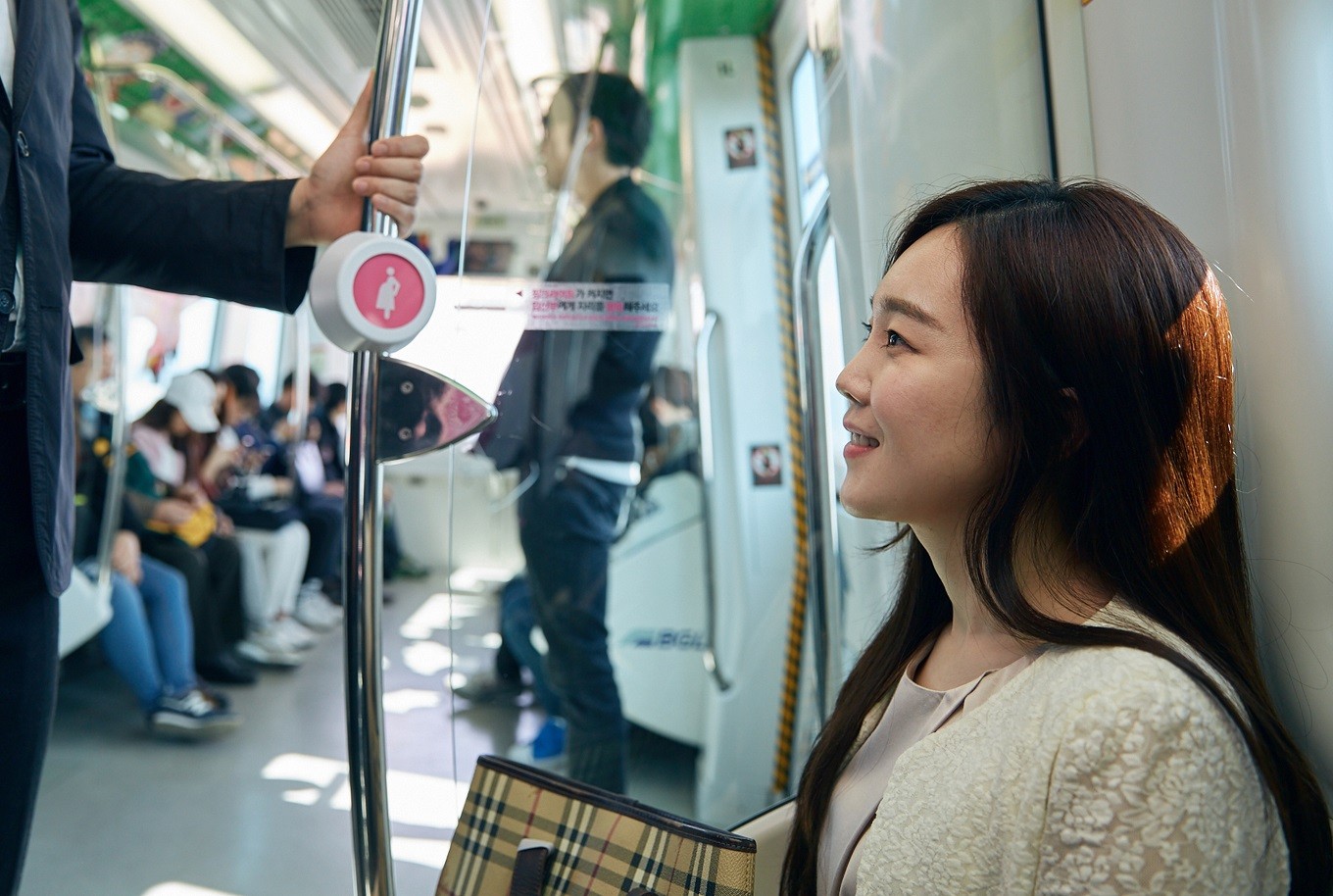Popular Reads
Top Results
Can't find what you're looking for?
View all search resultsPopular Reads
Top Results
Can't find what you're looking for?
View all search resultsSouth Korea uses technology to help pregnant women get seats
Change text size
Gift Premium Articles
to Anyone
 In this Wednesday, April 6, 2016 photo provided by Busan Metropolitan City, a woman sits on special priority seats next to a metal bar attached with a "pink light" wireless sensor in a subway train in Busan, South Korea. South Korea's second-largest city of Busan is testing a wireless technology it hopes can alleviate such problems and perhaps help address one of the biggest challenges facing the Asian country: a stubbornly low birthrate. (Busan Metropolitan City via AP/Kwon Sung-hoon)
In this Wednesday, April 6, 2016 photo provided by Busan Metropolitan City, a woman sits on special priority seats next to a metal bar attached with a "pink light" wireless sensor in a subway train in Busan, South Korea. South Korea's second-largest city of Busan is testing a wireless technology it hopes can alleviate such problems and perhaps help address one of the biggest challenges facing the Asian country: a stubbornly low birthrate. (Busan Metropolitan City via AP/Kwon Sung-hoon)
B
efore they show a baby bump, what some pregnant women in South Korea can expect when expecting is accusing glares when they take subway seats meant for pregnant, disabled or elderly passengers.
One South Korean city is testing a wireless technology it hopes can alleviate such problems and perhaps help address one of the biggest challenges facing the Asian country: a stubbornly low birthrate.
In April, the southeastern port of Busan, South Korea's second-largest city, began testing a small, round device called a beacon. Equipped with a wireless sensor, it activates a pink light attached to another sensor installed on a metal bar next to special priority seats, usually at the end of subway cars. The idea is to alert all nearby that the person carrying the beacon has a baby on the way.
The "Pink Light Campaign" can help non-pregnant passengers who might be occupying a seat designated for riders who are expecting to yield the spot without having to guess, is she or isn't she? In theory, pregnant women also can claim a seat without having to ask.
 In this Wednesday, April 6, 2016 photo provided by Busan Metropolitan City, a wireless sensor attached on a metal bar next to special priority seats blinks with pink light, signaling that a pregnant passenger is approaching or standing nearby, in a subway train in Busan, South Korea. South Korea's second-largest city of Busan is testing a wireless technology it hopes can alleviate such problems and perhaps help address one of the biggest challenges facing the Asian country: a stubbornly low birthrate.(Busan Metropolitan City via AP/Kwon Sung-hoon)
In this Wednesday, April 6, 2016 photo provided by Busan Metropolitan City, a wireless sensor attached on a metal bar next to special priority seats blinks with pink light, signaling that a pregnant passenger is approaching or standing nearby, in a subway train in Busan, South Korea. South Korea's second-largest city of Busan is testing a wireless technology it hopes can alleviate such problems and perhaps help address one of the biggest challenges facing the Asian country: a stubbornly low birthrate.(Busan Metropolitan City via AP/Kwon Sung-hoon)
"It is hard to tell if a woman is pregnant, and give up a seat, when she doesn't have a baby bump," said Lee Gyeong-eon, a 23-year-old college student who frequently travels by subway.
Other South Korean cities also are trying to make travel by public transportation friendlier to pregnant women. Seoul, the capital, has installed bright pink seats designated for women who are expecting.
(Read also: After Gamergate, female video game developers on the rise)
With one of the lowest birthrates in the world, South Korea is eager to encourage larger families. South Korean women had 1.21 children on average in 2014. The average for the wealthy nations belonging to the Organization of Economic Cooperation and Development was 1.68.
The Busan experiment is part of the trend toward the "Internet of Things," which uses wireless technology in products not usually associated with internet connectivity, such as toothbrushes or socks.
"I have felt a bit uncomfortable about getting a seat or claiming a seat reserved for pregnant women," said Ock Si-yoon, a 33-year-old who is expecting a baby. "Early on, there is a risk of miscarriage, so I'm a bit uneasy about using public transportation, since subways or busses shake a lot and it is difficult to get someone to yield a seat for me."
 In this Wednesday, April 6, 2016 photo provided by Busan Metropolitan City, a woman holds a bag with a small, round device called a beacon, the smaller one, written with "Pregnant passengers first" and equipped with a wireless sensor, in a subway train in Busan, South Korea. South Korea's second-largest city of Busan is testing a wireless technology it hopes can alleviate such problems and perhaps help address one of the biggest challenges facing the Asian country: a stubbornly low birthrate. The beacon activates a pink light attached to another sensor installed on a metal bar next to special priority seats usually at the end of subway cars. (Busan Metropolitan City via AP/Kwon Sung-hoon)
In this Wednesday, April 6, 2016 photo provided by Busan Metropolitan City, a woman holds a bag with a small, round device called a beacon, the smaller one, written with "Pregnant passengers first" and equipped with a wireless sensor, in a subway train in Busan, South Korea. South Korea's second-largest city of Busan is testing a wireless technology it hopes can alleviate such problems and perhaps help address one of the biggest challenges facing the Asian country: a stubbornly low birthrate. The beacon activates a pink light attached to another sensor installed on a metal bar next to special priority seats usually at the end of subway cars. (Busan Metropolitan City via AP/Kwon Sung-hoon)
"These days, people are usually looking at their phones and they are not really aware that a seat is reserved for pregnant women," she said. "But now, with the 'Pink Light Campaign,' it is easy for people to notice when the sensor blinks."
For now, Busan's trial of the technology is limited to a few sections of the city's transit system. But the city plans to expand it to more subway lines and to buses.
"Consideration for pregnant women should prevail and they should be able to use public transportation more easily and conveniently with this policy," said Suh Byung-soo, Busan's mayor.
"Women should be able to use city facilities easily even when they are expecting," he said.










